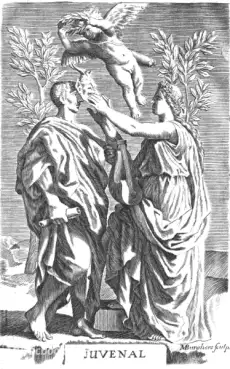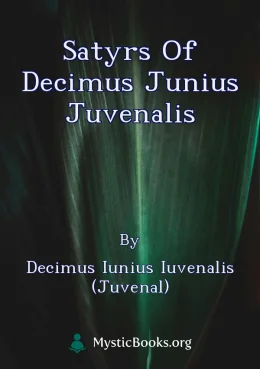
Timeline
Title
Country/Nationality
Decimus Iunius Iuvenalis (Juvenal)
Decimus Junius Juvenalis known in English as Juvenal was a Roman poet active in the late first and early second century AD. He is the author of the collection of satirical poems known as the Satires. The details of the author's life are unclear, although references within his text to known persons of the late first and early second centuries AD fix his earliest date of composition. One recent scholar argues that his first book was published in 100 or 101. Because of a reference to a recent political figure, his fifth and final surviving book must date from after 127.
Juvenal wrote at least 16 poems in the verse form dactylic hexameter. These poems cover a range of Roman topics. This follows Lucilius—the originator of the Roman satire genre, and it fits within a poetic tradition that also includes Horace and Persius. The Satires are a vital source for the study of ancient Rome from a number of perspectives, although their comic mode of expression makes it problematic to accept the content as strictly factual. At first glance the Satires could be read as a critique of pagan Rome. That critique may have ensured their preservation by the Christian monastic scriptoria although the majority of ancient texts did not survive.
Details of the author's life cannot be reconstructed definitively. The Vita Iuvenalis (Life of Juvenal), a biography of the author that became associated with his manuscripts no later than the tenth century, is little more than an extrapolation from the Satires.
Traditional biographies, including the Vita Iuvenalis, give us the writer's full name and also tell us that he was either the son, or adopted son, of a rich freedman. He is supposed to have been a pupil of Quintilian, and to have practised rhetoric until he was middle-aged, both as amusement and for legal purposes. The Satires do make frequent and accurate references to the operation of the Roman legal system. His career as a satirist is supposed to have begun at a fairly late stage in his life.
Biographies agree in giving his birthplace as the Volscian town of Aquinum and also, in allotting to his life a period of exile, which supposedly was due to his insulting an actor who had high levels of court influence. The emperor who is said to have banished him is given variously, as either Trajan or Domitian. A preponderance of the biographies place his exile in Egypt, with the exception of one, that opts for Scotland.
Juvenal’s Top Tips to Make Rome Great Again:
1. Get rid of the damn foreigners
2. Get rid of those effeminate queers
3. Make sure women Know Their Place
4. Get rid of the rich snobs
5. And the bloody nouveau riche
6. Return to the Good Old Days and the Simple Life
7. More people should be farmers and soldiers
8. Get back the sanctity of Family Life with parents teaching their children virtue and morality
9. Pay poets more money
Books by Decimus Iunius Iuvenalis (Juvenal)

Satires
These are a collection of sixteen satiric monologues where Juvenal does his best to poke his finger in the eye of the Roman society of his day for not living up to its heritage. Satires is a vicious, razor-sharp poem-as-polemic, a vitriolic lampoon;...

Satyrs of Decimus Junius Juvenalis
Juvenal was a Roman poet active in the late first and early second centuries CE, and his surviving works are a series of sixteen satires, targeting various aspects of the lives and morals of his contemporaries. The targets of Juvenal's scorn range fr...